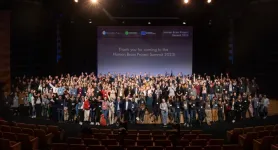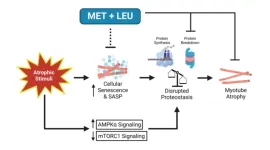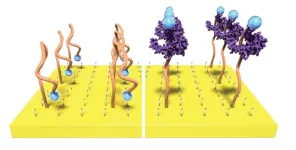(Press-News.org) A new study from a Washington University researcher offers fresh insights into how the brain goes to great lengths to processes and remember everyday events.
Zachariah Reagh, an assistant professor of psychological and brain sciences in Arts & Sciences at Washington University in St. Louis, and co-author Charan Ranganath of the University of California, Davis, used functional MRI scanners to monitor the brains of subjects watching short videos of scenes that could have come from real life. These included men and women working on laptops in a cafe or shopping in a grocery store.
“They were very ordinary scenes,” Reagh said. “No car chases or anything.”
The research subjects then immediately described the scenes with as much detail as they could muster. The mundane snippets led to intriguing findings, including that different parts of the brain worked together to understand and remember a situation.
Networks in the front part of the temporal lobe, a region of the brain long known to play an important role in memory, focused on the subject regardless of their surroundings. But the posterior medial network, which involves the parietal lobe toward the back of the brain, paid more attention to the environment. Those networks then sent information to the hippocampus, Reagh explained, which combined the signals to create a cohesive scene.
Researchers had previously used very simple objects and scenarios — such as a picture of an apple on a beach — to study the different building blocks of memories, Reagh said. But life isn’t so simple, he said. “I wondered if anyone had done these types of studies with dynamic real-word situations and, shockingly, the answer was no.”
The new study suggests that the brain makes mental sketches of people that can be transposed from one location to another, much like an animator can copy and paste a character into different scenes. “It may not seem intuitive that your brain can create a sketch of a family member that it moves from place to place, but it’s very efficient,” he said.
Some subjects could recall the scenes in the café and grocery store more completely and accurately than others. Reagh and Ranganath found that those with the clearest memories used the same neural patterns when recalling scenes that they used while watching the clips. “The more you can bring those patterns back online while describing an event, the better your overall memory,” he said.
At this time, Reagh said, it’s unclear why some people seem more adept than others at reproducing the thought patterns needed to access memory. But it’s clear that many things can get in the way. “A lot can go wrong when you try to retrieve a memory,” he said.
Even memories that seem crisp and vivid may not actually reflect reality. “I tell my students that your memory is not a video camera. It doesn’t give you a perfect representation of what happened. Your brain is telling you a story,” he said.
Reagh is one of the Washington University faculty members involved in the research cluster “The Storytelling Lab: Bridging Science, Technology, and Creativity,” part of the Incubator for Transdisciplinary Futures. Led by Jeff Zacks, chair of the Department of Psychological & Brain Sciences, with Ian Bogost and Colin Burnett, the Storytelling Lab explores the psychology and neurology of narratives.
In future, Reagh plans to study the brain activity and memory of people watching more complicated stories.
“The Storytelling Lab fits perfectly with the scientific questions that I find most exciting,” Reagh said. “I want to understand how the brain creates and remembers narratives.”
END
This is your brain on everyday life
Using brain scans to understand how we experience and remember our daily surroundings
2023-04-01
ELSE PRESS RELEASES FROM THIS DATE:
Iguana stole my cake! and left behind a nasty surprise
2023-04-01
**Note: the release below is a special early release from the European Congress of Clinical Microbiology & Infectious Diseases (ECCMID 2023, Copenhagen, 15-18 April). Please credit the conference if you use this story**
Embargo: 2301H UK time Friday 31 March
**Note – the press release is available in Spanish and Portuguese, see links below**
A 3-year-old girl was infected with an unusual Mycobacterium marinum infection, that developed following an iguana bite while she was on holiday in Costa Rica, report the doctors who treated her ...
Combination therapy a promising option for advanced kidney cancer patients already treated with immunotherapy
2023-04-01
Study Title: Belzutifan plus cabozantinib for patients with advanced clear cell renal cell carcinoma previously treated with immunotherapy: an open-label, single-arm, phase 2 study
Publication: The Lancet Oncology, March 31, 2023, 6:30pm ET, https://www.thelancet.com/journals/lanonc/article/PIIS1470-2045(23)00097-9/fulltext
Dana-Farber Cancer Institute author: Toni K. Choueiri, MD
Summary:
Immunotherapies, such as anti-PD-1 and anti-PD-L1, have become standard first line therapies for patients with advanced renal cell carcinoma (kidney cancer). Most patients, however, eventually experience disease progression, with no consensus on what therapy to use next. In this ...
Final Human Brain Project Summit closes with a vision for the future of digital brain research
2023-04-01
The ten-year European Flagship Human Brain Project (HBP) links brain research with computing and technology in a large-scale, interdisciplinary approach. During the HBP Summit, researchers presented the abundant scientific achievements of the project and the legacy that it will leave for the research community. With the project approaching its conclusion in September 2023, a focal point of the final HBP Summit in Marseille was the discussion of the future of digital brain research.
One of the lasting contributions of the project is the research infrastructure EBRAINS, which provides open access to advanced technologies, tools, data and services for brain research and will ...
Metformin & leucine prevent cellular senescence & proteostasis disruption
2023-03-31
“Cellular senescence and disrupted proteostasis induced by myotube atrophy are prevented with low-dose metformin and leucine cocktail.”
BUFFALO, NY- March 31, 2023 – A new research paper was published on the cover of Aging (listed by MEDLINE/PubMed as "Aging (Albany NY)" and "Aging-US" by Web of Science) Volume 15, Issue 6, entitled, “Cellular senescence and disrupted proteostasis induced by myotube atrophy are prevented with low-dose metformin and leucine cocktail.”
Aging coincides with the accumulation of senescent cells within skeletal muscle that produce inflammatory products, known as the senescence-associated secretory ...
Plastic transistor amplifies biochemical sensing signal
2023-03-31
Molecules in our body send faint biochemical signals when health issues arise
New technology boosts these signals by 1,000 times
New approach paves way for sensing signals in real-time in the body without sending blood or saliva samples to a lab
EVANSTON, Ill. — The molecules in our bodies are in constant communication. Some of these molecules provide a biochemical fingerprint that could indicate how a wound is healing, whether or not a cancer treatment is working or that a virus has invaded the body. If we could sense these signals in ...
Childhood asthma declines during COVID-19 pandemic
2023-03-31
Half as many children in the United States were diagnosed with asthma in the first year of the COVID-19 pandemic compared to previous years, and Rutgers researchers think fewer colds may be part of the reason.
In a new Rutgers study, published in Respiratory Research, researchers examined the rates of new asthma diagnoses in a large commercial insurance claims database during the first year of the pandemic compared with rates of new diagnoses during the previous three years.
Using the Health Core Integrated Research ...
Study shows ketamine could be beneficial for treating brain injury in children
2023-03-31
A common anesthesia drug could be beneficial in reducing pressure inside the skull of children with traumatic brain injuries (TBI), according to a study published in Critical Care Medicine.
Ketamine, a drug that has been used for anesthesia since the 1970s, has traditionally been avoided for patients with TBI due to early studies suggesting that it could raise the pressure inside of the skull, known as intracranial pressure (ICP).
More recent studies have suggested otherwise, said lead author Michael Wolf, MD, assistant professor of Pediatrics and Neurological ...
Yak milk consumption among Mongol Empire elites
2023-03-31
Photos
For the first time, researchers have pinpointed a date when elite Mongol Empire people were drinking yak milk, according to a study co-led by a University of Michigan researcher.
By analyzing proteins found within ancient dental calculus, an international team of researchers provides direct evidence for consumption of milk from multiple ruminants, including yak. In addition, they discovered milk and blood proteins associated with both horses and ruminants. The team's results are published in Communication Biology.
The study presents novel protein findings from an elite Mongol Era cemetery ...
Hope for salamanders? Illinois study recalibrates climate change effects
2023-03-31
URBANA, Ill. – For tiny salamanders squirming skin-to-soil, big-picture weather patterns may seem as far away as outer space. But for decades, scientists have mostly relied on free-air temperature data at large spatial scales to predict future salamander distributions under climate change. The outlook was dire for the mini ecosystem engineers, suggesting near elimination of habitat in crucial areas.
Now, University of Illinois researchers are tuning into the microclimates that really matter to the imperiled amphibians and forecasting a somewhat more hopeful future.
“The ...
Engineered E. coli delivers therapeutic nanobodies to the gut
2023-03-31
BOSTON-- Humans are colonized with thousands of bacterial strains. Researchers are now focused on genetically modifying such bacteria to enhance their intrinsic therapeutic properties.
One goal is to develop smart microbes that release therapeutic payloads at sites of disease, thus maintaining therapeutic efficacy while limiting many of the side effects that can be associated with the systemic administration of conventional drugs.
Investigators at Massachusetts General Hospital (MGH), a founding member of Mass General Brigham (MGB), have engineered a strain of the probiotic Escherichia ...
LAST 30 PRESS RELEASES:
How much sleep do teens get? Six-seven hours.
Patients regain weight rapidly after stopping weight loss drugs – but still keep off a quarter of weight lost
GLP-1 diabetes drugs linked to reduced risk of addiction and substance-related death
Councils face industry legal threats for campaigns warning against wood burning stoves
GLP-1 medications get at the heart of addiction: study
Global trauma study highlights shared learning as interest in whole blood resurges
Almost a third of Gen Z men agree a wife should obey her husband
Trapping light on thermal photodetectors shatters speed records
New review highlights the future of tubular solid oxide fuel cells for clean energy systems
Pig farm ammonia pollution may indirectly accelerate climate warming, new study finds
Modified biochar helps compost retain nitrogen and build richer soil organic matter
First gene regulation clinical trials for epilepsy show promising results
Life-changing drug identified for children with rare epilepsy
Husker researchers collaborate to explore fear of spiders
Mayo Clinic researchers discover hidden brain map that may improve epilepsy care
NYCST announces Round 2 Awards for space technology projects
How the Dobbs decision and abortion restrictions changed where medical students apply to residency programs
Microwave frying can help lower oil content for healthier French fries
In MS, wearable sensors may help identify people at risk of worsening disability
Study: Football associated with nearly one in five brain injuries in youth sports
Machine-learning immune-system analysis study may hold clues to personalized medicine
A promising potential therapeutic strategy for Rett syndrome
How time changes impact public sentiment in the U.S.
Analysis of charred food in pot reveals that prehistoric Europeans had surprisingly complex cuisines
As a whole, LGB+ workers in the NHS do not experience pay gaps compared to their heterosexual colleagues
How cocaine rewires the brain to drive relapse
Mosquito monitoring through sound - implications for AI species recognition
UCLA researchers engineer CAR-T cells to target hard-to-treat solid tumors
New study reveals asynchronous land–ocean responses to ancient ocean anoxia
Ctenophore research points to earlier origins of brain-like structures
[Press-News.org] This is your brain on everyday lifeUsing brain scans to understand how we experience and remember our daily surroundings




